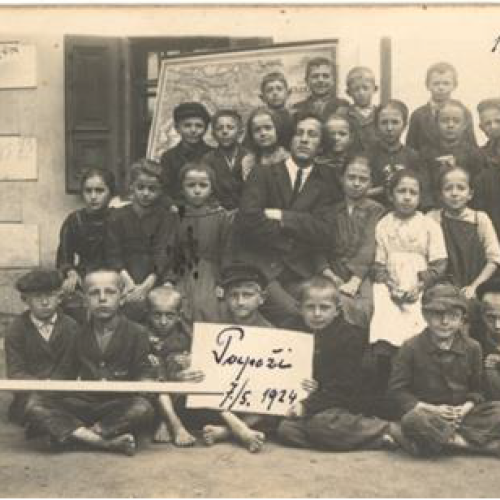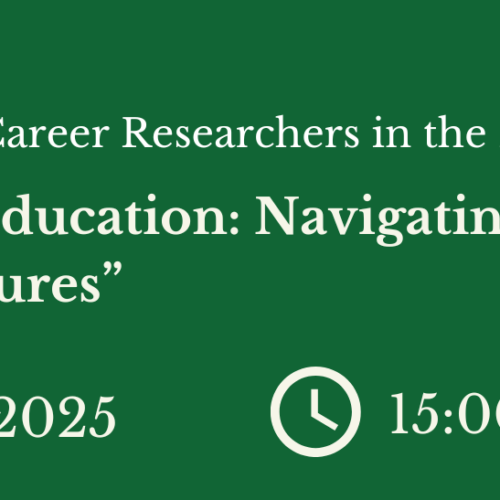CfA: Assistant Professor in Theory and History of Education Assistant Professor in Theory and History of Education at the University of Groningen
The Faculty of Behavioural and Social Sciences of the University of Groningen invites applicants for a permanent assistant professorship position in theory and history of education. This position is located at the basic unit Pedagogy, at the Department of Pedagogical and Educational Sciences (PedOn).
This position falls within the international tradition of theory and history of education (Allgemeine Pädagogik), and requires, in particular, an expertise in the overlapping fields of theory of education, educational philosophy and educational foundations. Candidates with expertise in educational law, policy or children’s rights preferably in relation to ethics and/or history are also encouraged to apply.
The position combines teaching (60%) with active participation in the research unit Education in Culture. In teaching, candidates are expected to teach (Dutch and English) in the Bachelor and the Master track Ethics of Education: philosophy, history and law, and to make substantial contributions to the supervision of BA theses, and MA theses and traineeships. Participation in managerial committees related to the organisation of the programmes and department is expected. Applicants with the relevant administrative experience will be offered the opportunity to coordinate the Master Track Ethics of Education.
In research, the candidates are expected to conduct research that expand on the work carried out at the research unit Education in Culture, and to actively participate in national and international networks. The candidate will be encouraged to develop a research funding plan allowing them to attract external funding in the short/medium term. Firmly embedded in international research networks, the senior members of the research unit will provide strong support in developing the candidate’s international visibility, an independent research line, and a viable funding strategy.
Organisation
The University of Groningen is a research university with a global outlook, deeply rooted in Groningen, City of Talent. Quality has had top priority for four hundred years, and with success: the University is currently in or around the top 100 on several influential ranking lists.
Our Faculty of Behavioural and Social Sciences is a center of knowledge focusing on individuals and society. We study issues relating to human behaviour, and the relationships between people and society as a whole. This includes the study of how people function under normal circumstances, but also of the problems encountered by individuals or groups, and how to resolve or prevent these. Our Faculty employs about 650 employees. For more information about the Faculty please check the link https://www.rug.nl/gmw/.
The basic unit of Pedagogy is part of the department of Pedagogy and Educational Sciences, at the Faculty of Behavioural and Social Sciences, University of Groningen. The unit contributes to a wide range of courses on Bachelor and Master level, including the Master track Ethics of Education: philosophy, history and law. In terms of research, the unit hosts two research units: Education in Culture, and Youth Studies. The candidate is expected to actively participate in the former unit, chaired by Johannes Westberg.
Education in Culture is an international hub for research in the theory and history of education, whose members examine education from the vantage point of educational sciences, history, literary studies, and religious studies. Consequently, the group provides an unusual opportunity for researcher with an interest in international and global perspectives on education. It provides an active research environment with regular research meetings, and recurrent international workshops and summer schools, and organizes together with the theory and history of psychology group the Dutch Centre in the Theory and History of Education and Psychology (DEEP).
For more information, see https://www.rug.nl/(…)ducation-in-culture/
Qualifications
- a completed PhD in relevant research fields
- relevant teaching experience and relevant teaching qualifications (such as Basic Education Qualification)
- an appropriate publication record in national or international journals
- promising lines of research that can attract subsidies and funding
- a track record of contributing to, or building, research groups and networks
- important competences are conceptual capacity, environment orientation, presenting and result orientation
- the ability to communicate and teach in Dutch and English.
Organisation
Conditions of employment
We offer you in accordance with the Collective Labour Agreement for Dutch Universities:
- depending on qualifications and work experience, a salary of € 3,974 (salary scale 11) to a maximum of € 6,181 (salary scale 12) gross per month for a full-time position
- a holiday allowance of 8% gross annual income an 8.3% end-of-the-year allowance
- attractive secondary and market terms of employment
- the position is classified in accordance with the University Job Classification (UFO) system; the UFO profile is Assistant Professor
- a temporary contract for a period of one year. After a positive result and development interview at the end of this year the contract will be converted into a permanent one.
Earliest starting date: February 1, 2023
Application
Do you want to become a member of our team? Please send your application to us, by submitting the following documents:
• letter of application
• curriculum vitae.
You may apply for this position until 8 January 11:59pm / before 9 January 2023 Dutch local time (CET) by means of the application form (click on “Apply” below on the advertisement on the university website).
The University of Groningen strives to be a university in which students and staff are respected and feel at home, regardless of differences in background, experiences, perspectives, and identities. We believe that working on our core values of inclusion and equality are a joint responsibility and we are constructively working on creating a socially safe environment. Diversity among students and staff members enriches academic debate and contributes to the quality of our teaching and research. We therefore invite applicants from underrepresented groups in particular to apply. For more information, see also our diversity policy webpage: https://www.rug.nl/(…)rsity-and-inclusion/
Our selection procedure follows the guidelines of the Recruitment code (NVP): https://www.nvp-hrnetwerk.nl/nl/sollicitatiecode and European Commission’s European Code of Conduct for recruitment of researchers: https://euraxess.ec.europa.eu/jobs/charter/code
We provide career services for partners of new faculty members moving to Groningen.
Unsolicited marketing is not appreciated.
Information
For information you can contact:
- Johannes Westberg, Full Professor in Theory and History of Education, b.a.j.westberg@rug.nl
Please do not use the e-mail address(es) above for applications.
Additional information
Here you find the full job description and the possibility to apply.
About author
You might also like
Reminder: Call for Applications to the 9th History of Education Doctoral Summer School. Deadline: Dec. 31, 2017
CALL FOR APPLICATIONS 9th HISTORY OF EDUCATION DOCTORAL SUMMER SCHOOLUniversity of Latvia, Riga, Latvia, 7–10 June 2018 This conference invites applications from postgraduate students in the history of Education
Call for Papers — The Vulnerability and Marginality of Youth in the Mediterranean Basin (19th-20th centuries), Revue d’histoire de l’enfance (RHEI)
La Revue d’histoire de l’enfance « irrégulière » consacre son prochain numéro à la façon dont la jeunesse marginale a été perçue et prise en charge dans les pays méditerranéens au XIXe et au XXe siècles….
Call for Papers – Historical Association of Slovenia (28-30 Sept 2016) Deadline 5 February 2016
The 38th HAS assembly will take place in collaboration with the Koroško zgodovinsko društvo / Carinthian Historical Society in Ravne na Koroškem (Slovenia) from 28-30 September 2016. The main theme



